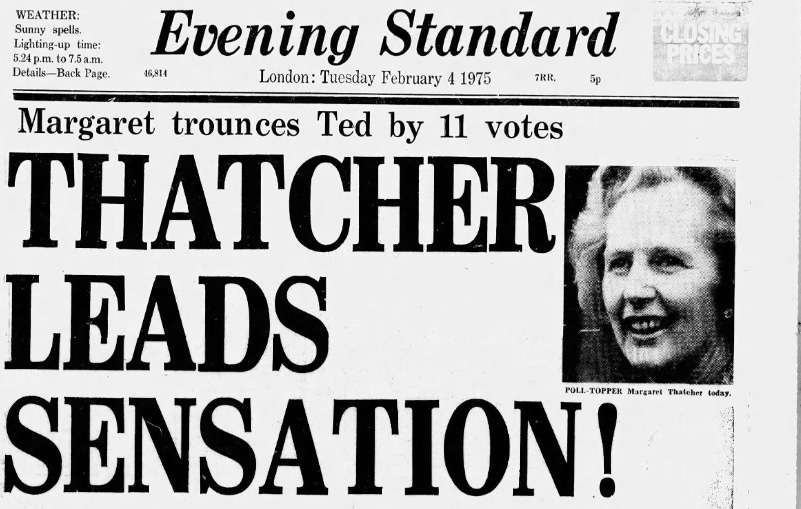Heath falls & Thatcher rises
An unlikely challenger takes on a stubborn leader, with an outcome that redefines the Conservative Party and the nation. In this extended article, I look back on the 1975 Tory leadership contest.
This is the latest in a series of posts on Conservative leadership elections. You can read about the previous contest in 1965 by clicking here.
Heath falls & Thatcher rises
by Lee David Evans
For the past fifty years, every Conservative leader who has been defeated at a general election has resigned shortly afterwards. In the aftermath of 1997, 2001, 2005 and 2024, John Major, William Hague, Michael Howard and Rishi Sunak, respectively, all took the blame for the party’s loss and exited the stage. Today, it is almost unimaginable that a defeated leader would do otherwise. But after the October 1974 election, the third contest in which Edward Heath led his party to defeat, the Tory leader resolved to carry on. He was going nowhere - at least not without a fight.
A big factor in Heath’s stubbornness was the chaotic state of the nation in the mid-1970s. The economy was in serious trouble, Labour had a tiny majority of just three seats, and his rival for the job of prime minister, Harold Wilson, had pledged to deliver a European referendum that was almost certain to split the Cabinet. Heath thought that only he, with his undoubted skills and experience, could lead the party through the tumult. What’s more, he thought the opportunity to return to government may be just around the corner. Lord Thorneycroft, a former Chancellor of the Exchequer, spoke Heath’s views back to him when he advised, ‘Most of the things you have predicted [about a Labour government] will, alas, come true and at that moment the Conservative Party will be very much weaker unless you are still at its head.’
Within the wider Conservative Party, however, the herd was moving against Heath. Arguably his closest friend in politics, Sara Morrison, told him that he couldn’t just carry on. So did several other allies, including Ian Gilmour, Lord Carrington, Jim Prior and Heath’s own former Chief Whip Francis Pym. In some cases, their view was that he should simply depart the scene in dignity; in others, it was, in the words of Prior, that ‘his only chance of carrying on as Leader was if he submitted himself to an early election through the 1922 Committee.’ Fight a leadership contest now and he had a decent chance of winning the backing of MPs; wait until it was forced upon him and he would give his critics time to organise.
The 1922 Committee executive met after the October election and were unanimous in their view that Heath should make his way towards the exit. Edward du Cann, the former party chairman who now chaired the 1922, was asked to meet Heath with their verdict. Even if Heath was willing to listen, and there is little evidence he was, du Cann was the wrong person to persuade him; Heath considered him a potential rival and thought he was acting in bad faith. (Du Cann and his allies did think he was a possible leader but Heath's assessment was wrong. Du Cann was, in fact, the only member of the 1922’s executive who thought Heath should remain leader, at least for a couple of years.). After their acrimonious discussion, relations between Heath and the 1922 were put on ice. Heath decided that until the executive elections took place on 7th November he would not engage with them and even refused their invitation to attend the first full 1922 Committee meeting of the Parliament. This foolishly raised the stakes in the executive elections and, when Heath’s allies put up a partial slate against the existing committee, the vote became a proxy on Heath’s leadership. The extent of Heath’s folly soon became clear: for the first time, the entire executive committee was re-elected. In the eyes of their fellow MPs, at least, the executive had not been overstepping the mark when they dispatched du Cann to tell Heath to go.
Finally recognising the rebellious mood among MPs, Heath conceded the need to renew his mandate as leader. His method for doing so would be a revision to the Conservative leadership rules. The top spot in the party was, in theory at least, a ‘freehold.’ There was no provision in the 1965 rules for challenging or re-electing the leader. As Nigel Fisher said, ‘It had not occurred to anyone when the rules were first devised… that a leader who had lost the confidence of a substantial section of the party would wish to continue in office.’ But they had not reckoned with someone as obstinate as Heath, and so the rules needed to change.




